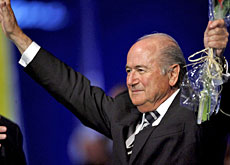Basel it like Beckham

Millions of filmgoers know the story of the Indian girl who defied her parents to play football, but not many know that the film's inspiration lives in Switzerland.
As millions watched the Fifa 2007 Women’s World Cup in China last month, Permi Jhooti – the first Asian female professional in England and a Fifa ambassador – welcomes the progress made in women’s football. She now plays for Concordia Basel.
The 36-year-old has lived in Basel since 2005 – when her husband started a job with pharmaceuticals giant Novartis – and when she is not on the pitch she works at the university’s heart research department as an IT specialist.
In Bend it Like Beckham, family tensions arise when the younger daughter becomes more interested in free kicks than the recipe for aloo ghobi. Jhooti says this was the same in her house, although she admits that her parents, who emigrated from India to England, did let her attend training sessions.
“But it was hard work,” she told swissinfo. “On the one hand they wanted to support me and help me realise my ambitions – as many Indian immigrant families do.
“But on the other they also wanted to protect me from the outside world, from possible racism and other dangers. It’s still rare for Asian girls to take part in this ‘men’s sport’.”
Busted!
Jhooti stuck at it and became the first female Asian professional in England, playing for the women’s teams of London clubs Fulham, Millwall and Chelsea.
When she was 29 years old she suffered a serious injury, but once recovered, she immediately wanted to continue playing.
“I felt top fit – above all mentally. I then played the best game of my life for the club – and ended up on television!”
However Jhooti hadn’t told her mother that she had started playing again. “When she saw me on TV she was shocked – but also proud.”
Nevertheless her mother wanted her to hang up her boots, believing a young woman must “marry and have children”. But Jhooti chose football.
She did eventually get married – albeit to a white Englishman, not an Indian. Jhooti said this was a bitter pill for her parents, who as immigrants in the 1960s had often been humiliated by the English. But she says her mother has since taken her son-in-law to her heart.
Challenges
Today Jhooti plays for Concordia Basel’s women’s team. But as an ambassador for Fifa, world football’s governing body, she travels around the world, helping to build women’s clubs and leagues.
She is also planning to visit her parents’ homeland. “In India there are also many young women who want to play football. But first of all the infrastructure must be created.”
After the opening game of the 2007 Women’s World Cup, Sepp Blatter, the Swiss president of Fifa, called for the tournament to be expanded from 16 teams to 24. “We have realised that in all countries of the world, women can play football. And they also play football where their culture will not permit them to play in public,” he said.
But Jhooti says that despite progress, women’s football remains a minority sport. “[Women] have a similar problem to that of Swiss men: the Italian, Spanish and English leagues are so strong that at a national level the Swiss clubs have hardly got a chance.”
But she is optimistic, although she admits that “football is not for women” attitudes still exist.
“When I started, there were few opportunities for women. Things are different now – also in Switzerland. People previously said tennis was a man’s sport – nowadays men and women receive the same prize money at the big tournaments.”
Integration
Jhooti also believes football can be a good means for foreigners to integrate in a new country – although she acknowledges that racism in football exists.
“Every immigrant has to make an effort to get to grips with their new homeland,” she said, adding that they shouldn’t simply wait until Switzerland offers them something.
“I’m learning German and French and I’m also trying to make personal contacts with Swiss people at work and at the football club.”
And so far she has had only positive experiences. “The people here are open and friendly – there is a great sense of community.”
swissinfo, based on a German article by Jean-Michel Berthoud
Bend it Like Beckham, directed by Gurinder Chadha in 2002, focuses on two young London women from different backgrounds who share a love for football and pressure from their families to conform.
One is a British Asian who struggles against her family’s orthodox mindset to fulfil her dream of playing professional football; the other is a white girl who has to combat her mother’s stereotypes about sporting ability and lesbianism.
The film’s title is a reference to the English footballer David Beckham and his skill at scoring from free kicks by “bending” the ball (making it swerve through the air).
Bend it Like Beckham sold 323,973 tickets in Switzerland, which has a population of 7.5 million. It also won the Audience Award at the 2002 Locarno International Film Festival.
Women’s football is still a minority sport but it is booming in Switzerland. Since 2003 the number of registered players has doubled to almost 18,000. At this rate football will soon become the most popular sport among Swiss females.
The under-20s Swiss national team took part in a world cup last year for the first time, and Lucerne team Luwin.ch became in the 2005/6 season the first Swiss team to reach the second group phase of the Uefa Women’s Cup, the women’s Champions League.
The 2007 Women’s World Cup took place in China from September 10-30. Sixteen countries participated, with Germany beating Brazil 2-0 in the final.

In compliance with the JTI standards
More: SWI swissinfo.ch certified by the Journalism Trust Initiative










You can find an overview of ongoing debates with our journalists here . Please join us!
If you want to start a conversation about a topic raised in this article or want to report factual errors, email us at english@swissinfo.ch.